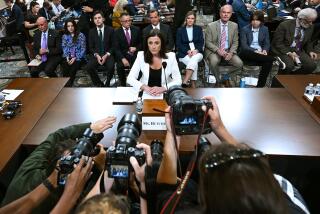Justice Dept. May Review Action if Information Was Withheld : Inquiry Into Hutton Case Heats Up
WASHINGTON — A congressional panel’s inquiry into how federal officials deal with white-collar crime is leading to renewed interest in the Justice Department’s failure to seek indictments in the E. F. Hutton check overdrafting case.
Documents released by the House Judiciary subcommittee on crime show that former Hutton President George L. Ball and other top company officials were aware that the firm was engaging in a pattern of overdrawing some of its checking accounts to keep the banks from earning interest on money that Hutton considered its own.
It is unclear whether those officials knew at the time that some Hutton officers were using that tactic in ways that the company subsequently admitted crossed the line between aggressive cash management and illegal banking activity. Justice Department officials say the documents that have been made public by the subcommittee so far do not implicate top Hutton officials criminally.
The government decided to accept a guilty plea from the firm and not seek criminal indictments against any individuals.
Hutton pleaded guilty in May to 2,000 counts of mail and wire fraud and paid a $2-million fine in connection with its check-writing procedures in 1981-82.
The crime subcommittee is gathering new Hutton documents as part of its continuing inquiry and sharing them with the Justice Department. Mark Sheehan, a Justice Department spokesman, refused to confirm or deny a report in Friday’s Wall Street Journal that the department is looking into whether Hutton improperly withheld information from prosecutors before settlement of the case.
“If there was some hiding of information at the time or if there was anything additional, that remains to be seen, and we will review that if such information comes to light,” Atty. Gen. Edwin Meese III told reporters Wednesday in response to questions about similar reports.
The case--particularly the issue of personal culpability of Hutton’s top management--is complicated by the nature of the transactions involved. For one thing, some of the procedures available to large commercial checking account holders such as Hutton are not available to individuals--making comparisons difficult.
Most of the 400 banks that Hutton was dealing with during the period of activity that led to its conviction knew what the firm was doing and dealt with it either by demanding payment for interest lost to the banks or, if Hutton refused, by refusing to handle Hutton accounts.
In testimony to the crime subcommittee on June 19, Hutton Chairman Robert M. Fomon said the firm still stands by the basic cash management policy that he acknowledged led to illegal excesses. He said the firm is installing a $42-million computer system that will allow Hutton officials in New York to monitor the daily checking account activity of its branches.
The Justice Department granted immunity to dozens of mid-level Hutton officials who actually implemented the scheme, saying it had to do that to get to the bottom of the case.
A Nov. 20, 1981, report to Ball and other top Hutton officials on the profitability of the various Hutton regional brokerage offices said that “interest profits contributed over 70% of net profit for the retail (brokerage) firm in 1981.”
That remark underscores why the firm put so much emphasis on its regional managers--whose salaries are pegged to their operation’s profits--milking all interest possible from the money flowing through the Hutton system.
More to Read
Get the L.A. Times Politics newsletter
Deeply reported insights into legislation, politics and policy from Sacramento, Washington and beyond. In your inbox three times per week.
You may occasionally receive promotional content from the Los Angeles Times.










